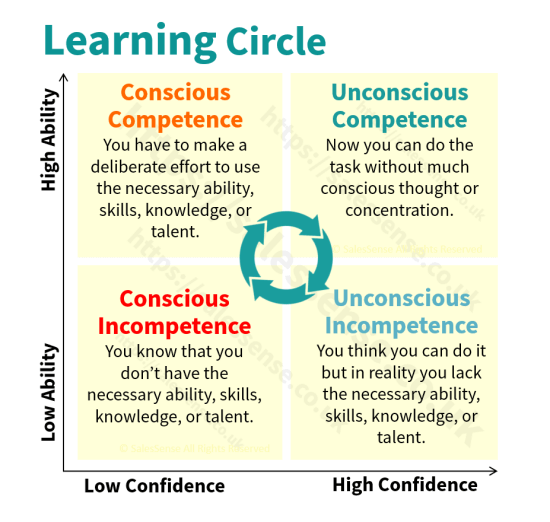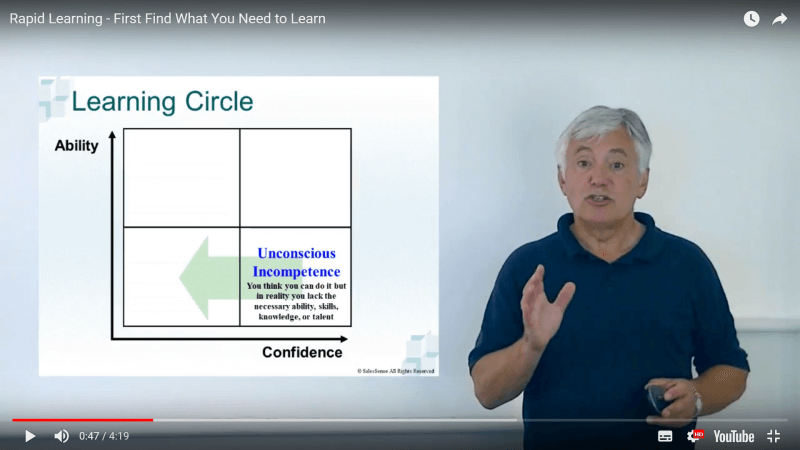Use the learning circle to guide rapid learning and accelerate sales performance.
Learning how to learn may seem like a basic objective that everyone acquires in school. Yet rapid learning demands that we recognise the circular nature of the learning process. Learning has to be refreshed, reviewed, and updated less it morphs into something counterproductive.
This is part one of a short series of articles and videos that explain how to accelerate learning and motivate behaviour change.
Do you remember when you first stepped into a car to learn how to drive?
What happened?
Did you stall the engine?
I did.
You see I thought I would be able to start the engine and just pull away, but I didn’t have the skills.
I was unconsciously incompetent. I didn’t even know what I needed to learn.
I quickly realized that I didn’t know how to balance the power of the engine against the clutch to pull away in a controlled manner.
I had become conscious of my incompetence. I needed to try, and fail, to understand what I didn’t know how to do.
How did your learning progress?
Do you remember how hard it was to make a hill start at a T junction in traffic?
When I first encountered such a junction, my understanding of the skills I needed expanded again.
Pulling out into traffic while balancing the power of the engine against the clutch on a hill, demands the ability to do several things at the same time.
My first few such experiences were a bit stressful.
After some kangaroo starts that frightened me, my instructor and other motorists, I found I could make a T junction hill start if . . I concentrated very hard.
I had developed conscious competence.
With much practice, I developed unconscious skills.
Eventually, I learned to manage all aspects of driving a car without much conscious effort. At last I could relax and enjoy the experience,
for a while anyway.
Then . . after a while, I began developing bad habits, unconscious bad habits.

You see learning is a circle. Having achieved unconscious competence, I inevitably progressed back to unconscious incompetence.
For example, forgetting to look over my shoulder to check my blind spot before pulling out to overtake another car.
Picture yourself driving on a motorway. You glance in the mirrors and it looks clear. You indicate, accelerate, and start to overtake the car in front.
BLAAAAHHHH. The driver in your blind spot protests with a blast of his horn.
Is this experience a familiar one?
It instantly shoved me back into the conscious incompetence quadrant.
So what steps should a person take to accelerate learning?
First, we need to learn what we don’t know we don’t know, as Donald Rumsfeld put it.
Sometimes the only way to achieve this is to try and fail, ideally in a safe situation.
"Fail forwards faster", wrote Tom Peters.
Next, we need lots of practice so that we can use our knowledge freely and with confidence.
"To know and not to do is not to know," said Stephen Covey.
In other words, it is next to useless to know something and not use the knowledge for a practical purpose.
So the learning circle guides learning.
First, we need to know what we need to know. Then we have to learn it through repetition and practice before we can make reliable or habitual use of new learning.
There are some learning preparation templates to go with this presentation. If you use them, they will help you identify and develop the skills and capabilities that you need:
Arrange a call with me and I will send you a free copy of our Sales Professionals Toolkit. It contains a sales skills and habits assessment.
These documents are also available on request:
- Responsibilities and Tasks Template
- Self-Directed Learning Preparation Questionnaire
- Learning Questions - Use these questions to test the value of specific knowledge, methods, and skills.
This is the first in a short series of videos and articles that help accelerate sales performance through rapid learning techniques.
Micro course by Clive Miller
Learning how to learn is the starting point. Rapid learning is a habit that needs nurturing. If you need to improve learning amongst customer-facing staff, or increase expertise in a sales team, get in touch. Telephone +44 (0)1392 851500. We will be pleased to learn about your needs or talk through some options. Alternatively, Send an email to custserv@salessense.co.uk or use the contact form here.













